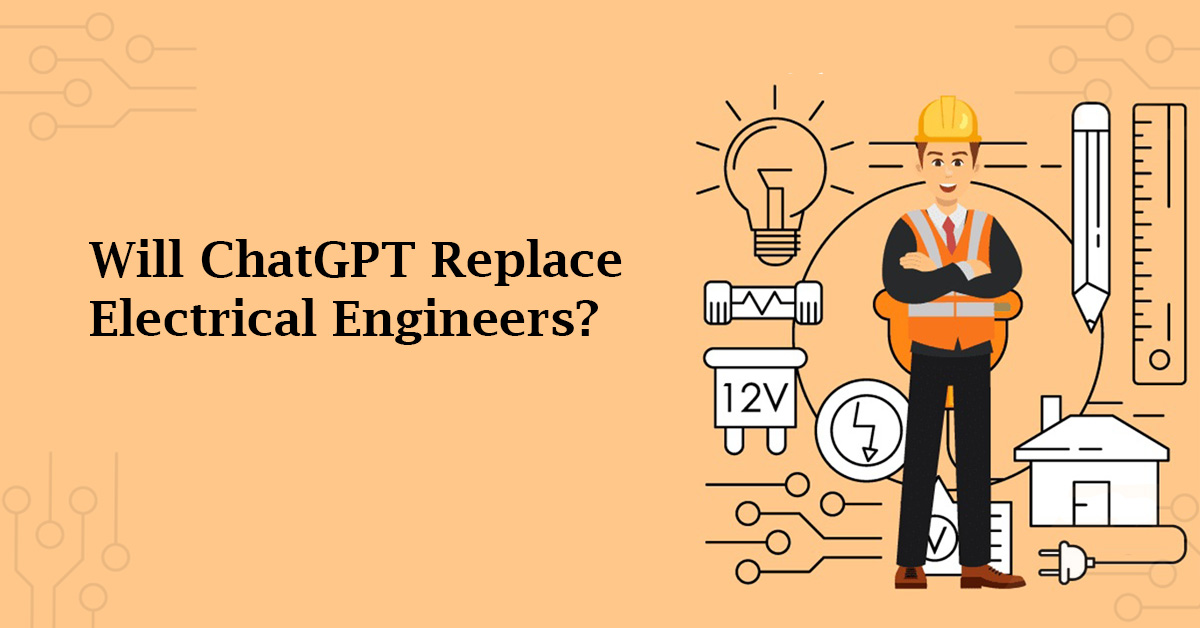
AI is making waves in various fields like marketing, manufacturing, education, and engineering. Various engineers are enjoying the benefits of artificial intelligence like ChatGPT in their work and are even more open to incorporating more AI tools.
The question on people’s minds is whether Artificial Intelligence (AI) can replace professionals like electrical engineers. The answer is no. Read on to learn why.
What is the Future Impact of ChatGPT on Electrical Engineering?
The future impact of ChatGPT on electrical engineering is likely to be significant. As AI advances in engineering, ChatGPT has the potential to assist electrical engineers in a variety of ways, including data analysis, design optimization, and predictive modeling.
For example, ChatGPT can analyze large data sets and provide insights that can help electrical engineers make more informed decisions. The query we used for analysis is shown below:

And ChatGPT generated the following result:
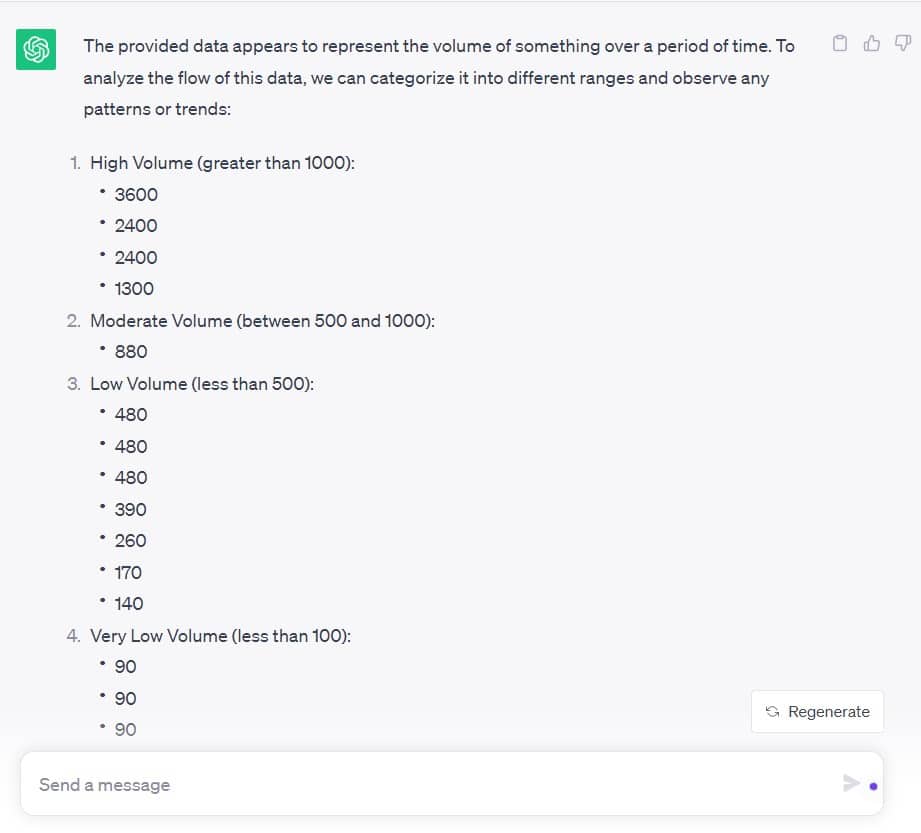
Moreover, ChatGPT is useful for optimizing the performance of existing electrical systems.
This can lead to cost savings and improved energy efficiency. For instance, ChatGPT can analyze power consumption patterns and suggest changes to improve efficiency or identify issues that may be causing inefficiencies.
ChatGPT can help electrical engineers predict potential failures and suggest preventive measures.
For example, ChatGPT can analyze sensor data from a machine to predict when it will require maintenance or identify potential issues that could lead to failure.
Overall, the future impact of ChatGPT on electrical engineering is likely to be positive. While ChatGPT cannot replace human expertise, it can assist electrical engineers in their work and help them make more informed decisions.
Why ChatGPT Cannot Replace Electrical Engineers?
ChatGPT can assist electrical engineers in a variety of tasks. However, there are several reasons why ChatGPT cannot replace electrical engineers.
Human Expertise and Creativity
Electrical engineering involves more than just technical knowledge and data analysis. It requires creativity, problem-solving skills, and critical thinking abilities.
Electrical engineers bring a unique perspective to their work that AI tools like ChatGPT cannot replicate. They can think outside the box and come up with innovative solutions to complex problems.
For example, an electrical engineer may come up with a creative design solution that minimizes costs or increases energy efficiency. This kind of creative problem-solving is difficult for ChatGPT to replicate.
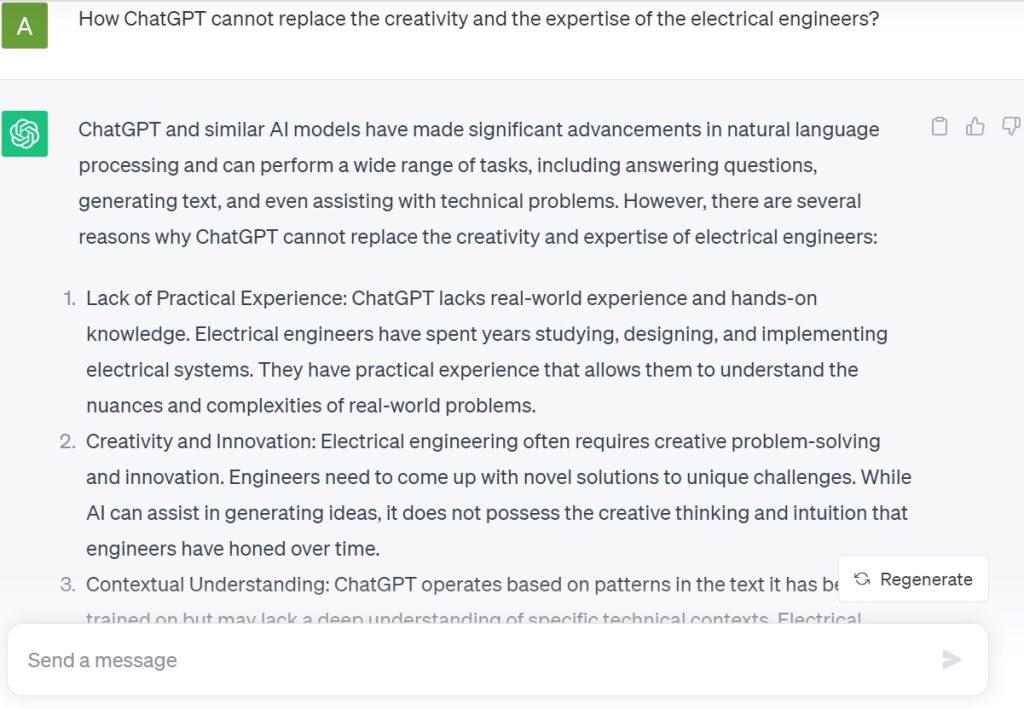
Unpredictable and Complex Situations
Electrical engineers often work with complex and unpredictable systems. They must be able to adapt to unexpected situations and make quick decisions.
ChatGPT, on the other hand, is only as good as the data it has been trained on. It cannot handle unpredictable or complex situations that may arise during an electrical engineering project.
For example, an electrical engineer may encounter unexpected challenges while working on a project, such as a power outage or malfunctioning equipment.
They must be able to quickly diagnose the problem and come up with a solution. ChatGPT may not be able to handle these types of unexpected situations.
Communication Skills
Electrical engineers must often work in teams and communicate complex technical information to non-technical stakeholders.
They must be able to explain their work in a way that is understandable to others. ChatGPT cannot communicate in the same way that humans can. It cannot interact with stakeholders or understand their concerns.
For example, an electrical engineer may need to explain the benefits of a new technology to a client or a project manager. They must be able to explain the technical details in a way that is easy for the client to understand. ChatGPT cannot communicate in the same way that a human can.
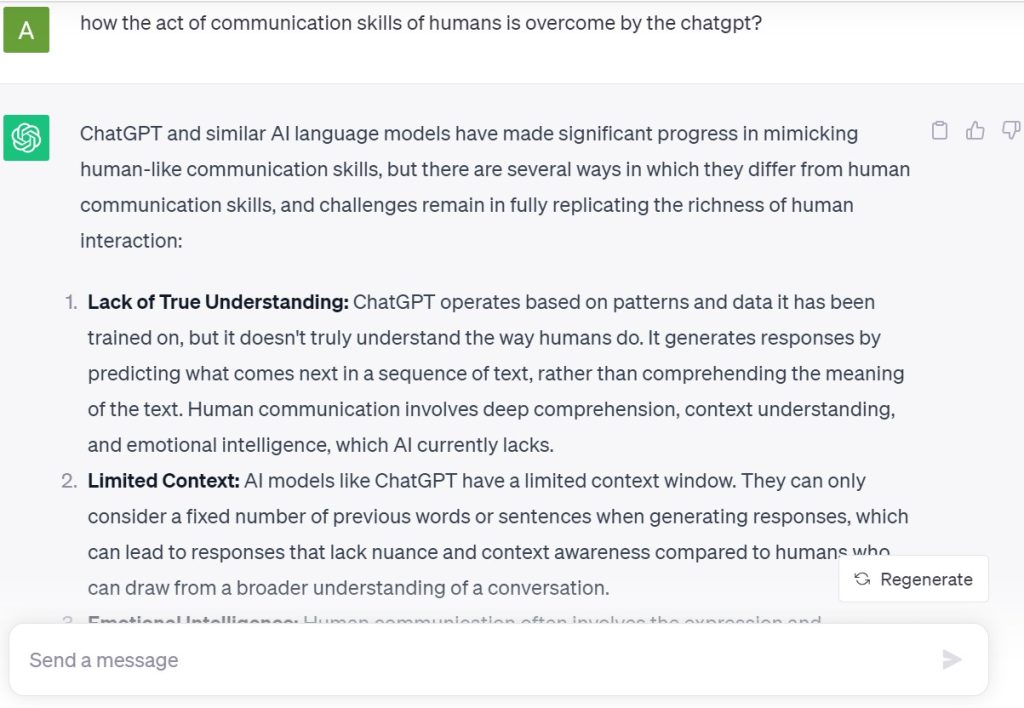
How Does ChatGPT Affect Electrical Engineers?
ChatGPT is an AI tool that has the potential to impact the work of electrical engineers in several ways. Here are some ways that ChatGPT affects electrical engineers:
Increased Efficiency in Design
ChatGPT can also be used to increase efficiency in the design process. By analyzing data and identifying patterns, ChatGPT can help electrical engineers optimize the design of electrical systems.
ChatGPT can suggest design changes that could improve energy efficiency or reduce costs. This can help electrical engineers create more effective designs in less time.
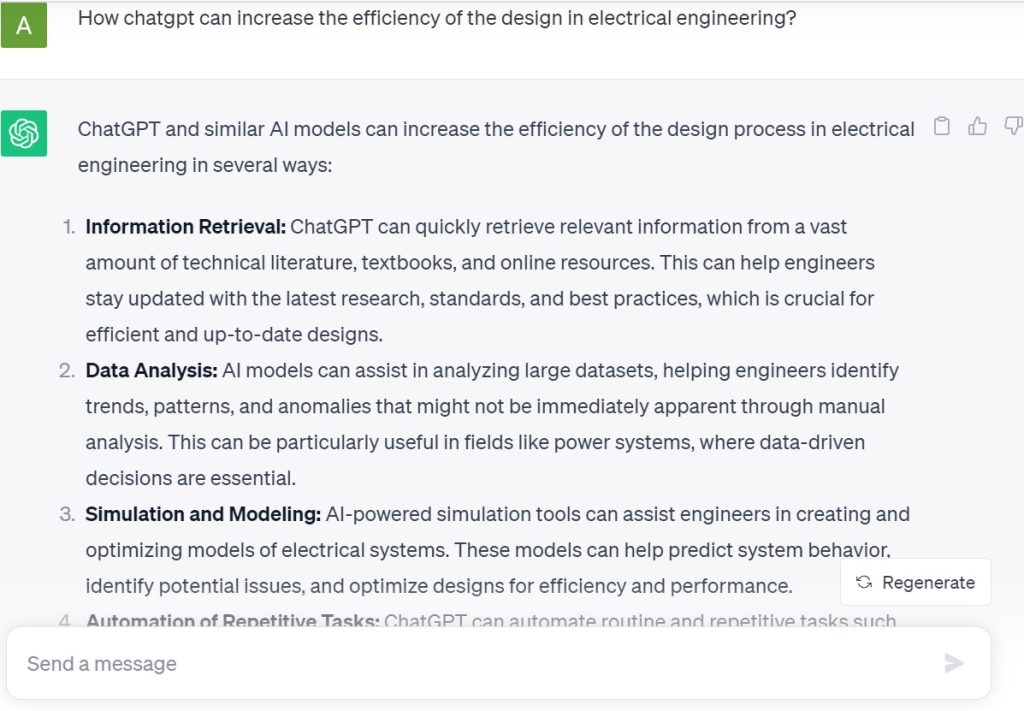
Improved Predictive Modeling
Another way that ChatGPT can impact electrical engineering is through improved predictive modeling.
By analyzing data and identifying patterns, ChatGPT can help electrical engineers predict potential failures and take preventative measures.
For example, ChatGPT can analyze data from a machine to predict when it will require maintenance or identify potential issues that could lead to failure. This can help electrical engineers take action before a problem occurs, which can save time and money.
Collaboration and Support
ChatGPT can be used to facilitate collaboration and support among electrical engineers. The AI offers real-time support and feedback to engineers as they work on a project.
For example, ChatGPT can be used to provide suggestions or guidance on a specific task or to provide information on a particular topic. This can help electrical engineers work more efficiently and effectively and can also help them learn and grow in their field.
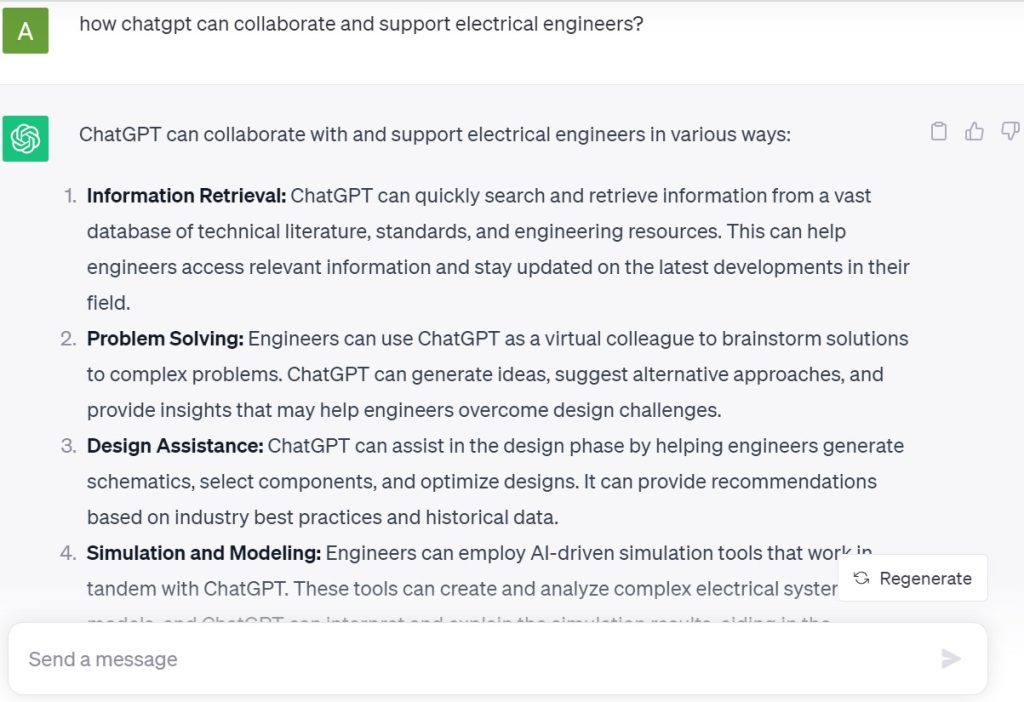
Which Aspects of Electrical Engineering Does ChatGPT Improve?
ChatGPT is an AI tool that can improve several aspects of electrical engineering. Here are some specific aspects that ChatGPT can improve:
Data Analysis
One of the primary areas where ChatGPT can improve electrical engineering is in data analysis. Electrical engineers work with large amounts of data, and ChatGPT can help analyze that data more quickly and accurately.
For example, ChatGPT can analyze data from sensors or other devices to identify patterns or anomalies. This can help electrical engineers diagnose problems more quickly and accurately, which can save time and money.
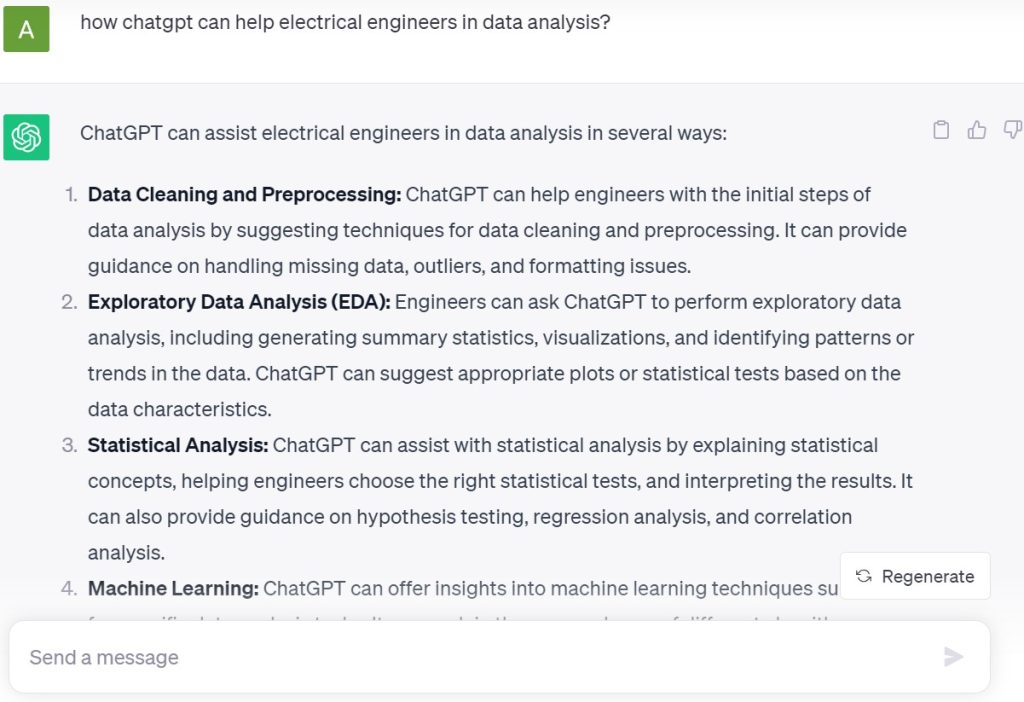
Design Optimization
ChatGPT can help optimize the design of electrical systems. By analyzing data and identifying patterns, ChatGPT can suggest design changes that could improve energy efficiency or reduce costs.
For example, if an electrical engineer is designing a power distribution system, ChatGPT can provide suggestions on how to optimize the design to minimize energy loss.
Real-Time Support and Feedback
ChatGPT can provide real-time support and feedback to electrical engineers. ChatGPT can be used to provide suggestions or guidance on a specific task or to provide information on a particular topic.
For example, if an electrical engineer is working on a complex project, ChatGPT can provide real-time support and feedback to help the engineer work more efficiently and effectively.
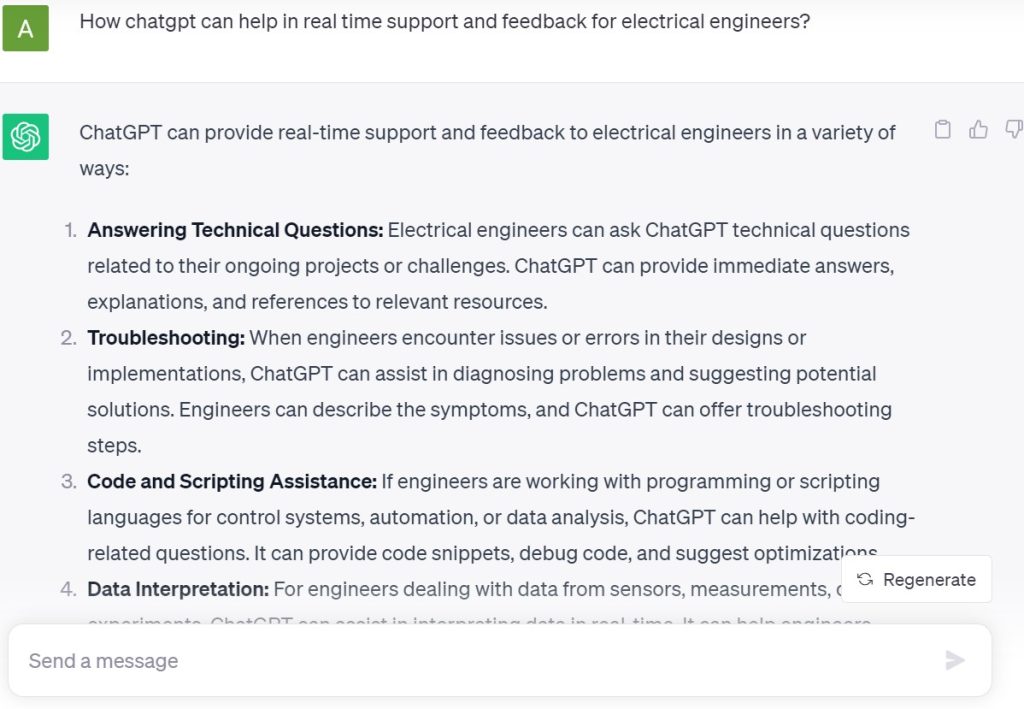
Documentation and Communication
ChatGPT can assist with documentation and communication in electrical engineering. Electrical engineers often need to document their work and communicate their findings to others.
ChatGPT can help automate this process by generating reports or providing suggestions for how to communicate findings more effectively.
What Are the Drawbacks of Using ChatGPT in Electrical Engineering?
While there are several benefits to using ChatGPT in electrical engineering, there are also some drawbacks that should be considered:
Limited Domain Knowledge
ChatGPT can generate responses based on the data it has been trained on. However, it may not have sufficient domain knowledge to provide accurate responses to complex questions or issues that require specialized knowledge.
For example, ChatGPT may not be able to diagnose complex electrical problems that require specialized knowledge and expertise. Rather, it will just pen down the steps which are not applicable in every case:
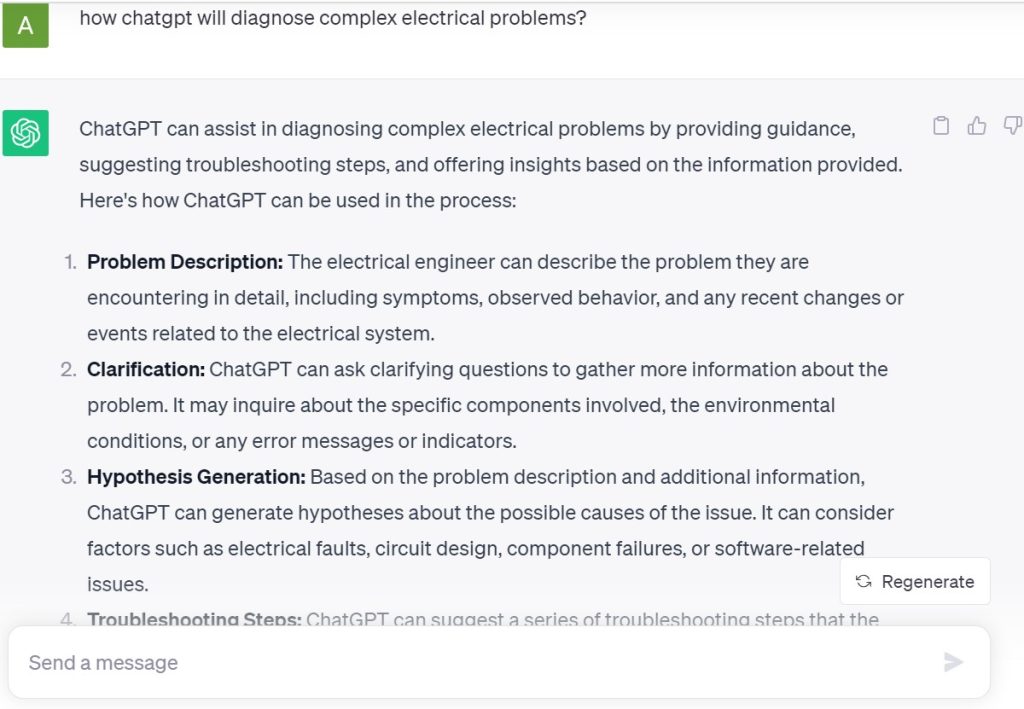
Potential Bias
ChatGPT’s responses are based on the data it has been trained on, and this data may contain biases. If the data is biased, ChatGPT’s responses may also be biased.
For example, if the data used to train ChatGPT is biased toward a particular type of technology or system, it may provide biased responses or recommendations.
Lack of Creativity
While ChatGPT can provide suggestions and recommendations based on existing data, it may lack creativity and innovation.
Electrical engineering often requires creativity to come up with novel solutions to complex problems, and ChatGPT may not be able to provide innovative solutions. Let’s see what ChatGPT has to say on the novel solutions:
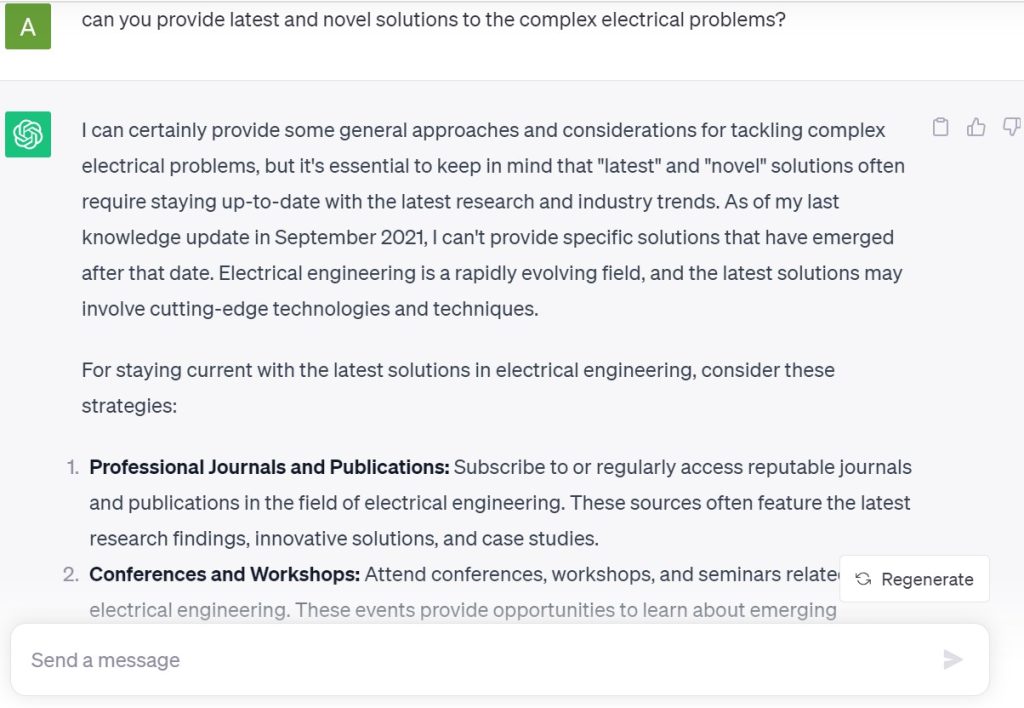
Security Risks
ChatGPT can process large amounts of data, which may include sensitive information. However, there are potential security risks associated with using ChatGPT, including the risk of data breaches or cyberattacks.
FAQs
Is ChatGPT Relevant to Electrical Engineering?
Yes, ChatGPT can be relevant to electrical engineering as it has the ability to assist in tasks such as data analysis and prediction modeling.
Can ChatGPT Replace Electrical Engineers?
No, ChatGPT cannot replace electrical engineers as there are many tasks that require human expertise and decision-making skills. Electrical engineers bring a unique set of skills and knowledge to their work that cannot be replicated by AI alone.
Do Electrical Engineers Support ChatGPT?
The support for ChatGPT among electrical engineers varies from individual to individual. Some may see AI as a helpful tool, while others may have concerns about its potential impact on their profession.
When Will ChatGpt Replace Electrical Engineers?
It’s important to note that ChatGPT or any AI technology cannot replace human expertise. While AI technology can assist in certain tasks, it cannot replace the critical thinking, creativity, and problem-solving skills of human electrical engineers.
Can I Use ChatGPT to Get Clients for My Electrical Engineering Work?
While you may be able to use ChatGPT to assist in finding clients for your electrical engineering work, it’s important to remember that it’s not a replacement for personal networking and building relationships with potential clients.